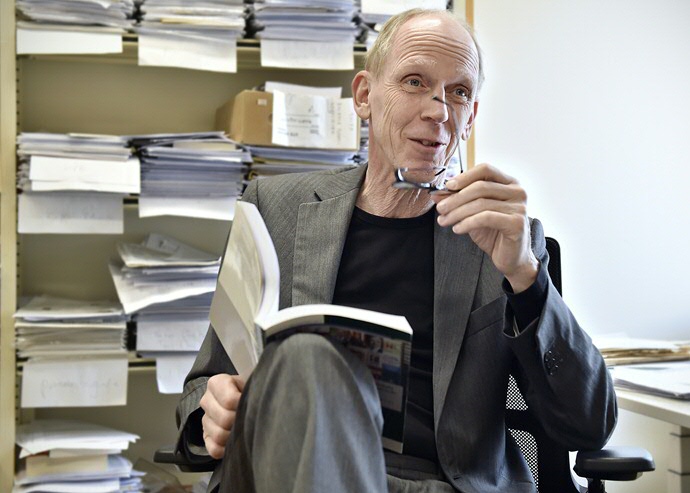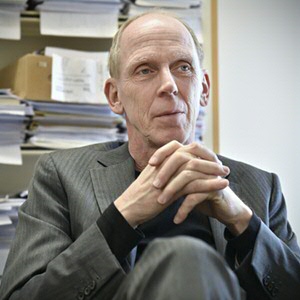Gerrit Voerman on populism and political parties

Political parties, populism, manifestos; these are all issues that interest the Documentation Centre for Dutch Political Parties (DNPP). The centre is headed by Gerrit Voerman, professor of the Development and Functioning of the Dutch and European Party Systems at the University of Groningen and author of several books on politics and political parties. He argues that political parties should be given more freedom to organize and structure themselves as they wish. ‘Circumstances change’
Text: Martin Althof, Communication / Photos: Elmer Spaargaren
The will of the people
‘Boer Koekoek was perhaps the first populist in the 1960s, because of his style of politics. Although the sovereignty of the people wasn’t his main priority, he was a former member of the CHU, the Christian Historical Union. He was later followed by Janmaat and the Centre Democrats, the liveable moment, the early Socialist Party (SP) and then Fortuyn, the Party for Freedom (PVV) and Forum for Democracy.’ Gerrit Voerman studies the origin and characteristics of populism in the Netherlands. Voerman: ‘Populists distance themselves from the elite, they are against the political establishment. They think that the people are being neglected, that the will of the people is being ignored. They see political parties as middlemen, who should actually be removed from the system altogether. Populists refer to the “political cartel” and are advocates of direct democracy (for example, by holding referenda). Geert Wilders even claims that the PVV is the “true embodiment of the will of the people”. Party ideologist Martin Bosma puts a sophisticated spin on that claim by stating: “We are the most modern party; we don’t have any members, we create a direct channel of communication between parliamentarians and the people.”’
Parliamentarians
The question we then need to ask ourselves is: how do they know what the ‘will of the people’ actually is? How do you find that out? Gerrit Voerman: ‘Fleur Agema (PVV) once shone a little light on the matter. She said that she went downstairs every morning to check the newspapers and formulated questions to ask in Parliament based on what she had read. So, essentially based on news coverage in the media.’ The fact that the PPV doesn’t have any members poses a number of problems. Voerman: ‘It’s very hard for the party to find good candidates, not only for the House of Representatives but also for the Provincial Councils and local councils. There are no party members, there’s no structure, which often means that they field a list of unknown candidates at the last minute. And that has repercussions.’
Freedom for political parties
Voerman sat on the Veling Committee which published the ‘Public interest of political parties’ report a few months ago. This states, among other things, that more weight should be given to the number of members when allocating subsidies to political parties. The Committee also advocated scrapping the lower limit of 1000 members, which parties currently have to reach to qualify for a government subsidy. Instead, the committee suggested that a party must have at least one seat in Parliament. It will soon also be prohibited to accept gifts from abroad. The Committee also advocated relaxing the organizational requirements on political parties.
No mandatory rules
Voerman: ‘The question is whether it’s necessary for the government to draw up mandatory rules for setting up political parties that are then supposed to scrutinise the actions of that same government. To get a new party on the electoral list you have to set up an association which has full authority. You can get around that, but there are consequences. The PVV does so by having no members, but then it’s not entitled to subsidies from the government. I wouldn’t set too many requirements for the organizational structure. Circumstances change; I don’t think today’s political parties should be forced to adopt the model used by political parties that were founded over 150 years ago.’ Voerman argues that these rules should be laid down clearly in a separate law. ‘At the moment it’s covered in different laws. It’s what Ruud Koole termed “codification by stealth”. I think there should be more clarity, with as much freedom as possible for political parties to organize and structure themselves as they wish.’

Fluctuations in election results
Voerman would like to write a book about political developments in the Netherlands from 1994 until the present day. ‘A period in which the Netherlands has been stable in its instability, as it were. We have had more major fluctuations in election results than other Western countries. The voter has become much more mobile. Previously unquestioned attitudes have disappeared, pillarization is a thing of the past. The voter, however, doesn’t just skip from pillar to post; the left-right divide continues to form the backbone of electoral behaviour. But voting isn’t always a purely rational process. Some people don’t always vote for the party that, at first sight, might do the most for them. Sometimes people vote strategically. Emotions and recognizability also play a role, as does trust in the party leader. And fear of new developments, like globalization.’
Higher demands on the local council
This is also reflected in the results of the most recent local elections, where the local parties were the big winners. They are much better than the national parties at putting local issues on the agenda, often helped by the fact that their candidates are more well known, for example because they participate more in local activities. Voerman notes that it is becoming increasingly difficult for parties to find good candidates for the local council. ‘And at a time when that’s more important than ever. More and more demands are being placed on local councils, and therefore on the local council members, especially due to the decentralization of tasks. Significantly increasing allowances for working on the local council would really help parties to find good people who are willing to put themselves forward.’
More news
-
26 February 2026
What can the law do for women? Join International Women’s Week!
-
08 December 2025
Colourful Characters: Bert Röling
